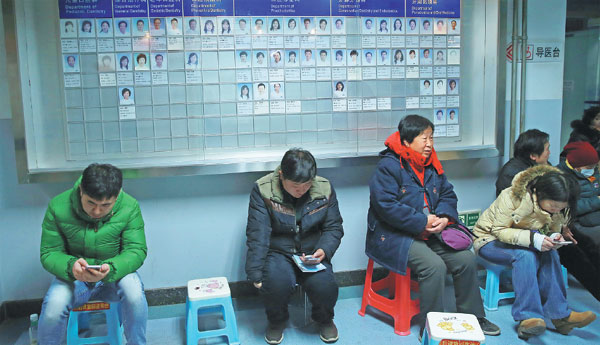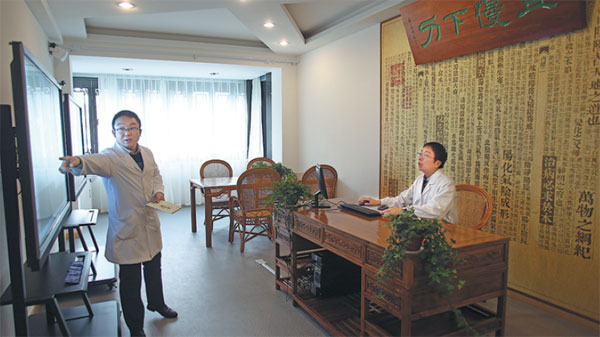Health care at your fingertips
Updated: 2016-02-22 14:00
By Liu Zhihua(China Daily USA)
|
||||||||
Technology is changing the way we go about staying healthy or getting well
They may not have the bedside manner of the very best doctor, but the kind of apps that bring pizzas and taxis to your front door may now be in the process of revolutionizing the way medical care is delivered.
For many Chinese that means not only being much more aware of their state of health and being able to take the appropriate steps when necessary, but avoiding time-consuming waits in long hospital queues that have long been one of the biggest headaches for anyone seeking medical care.
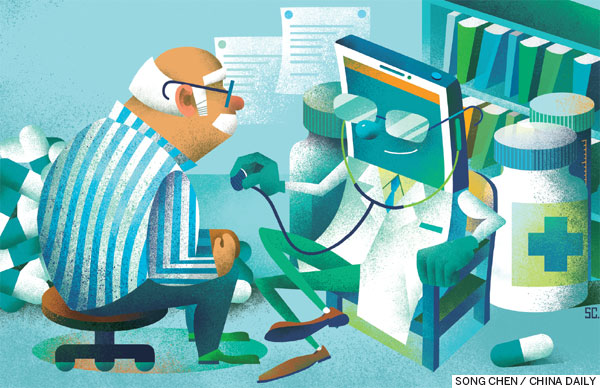
|
Getting a registration ticket in Beijing's prestigious hospitals is still a tiresome business. Photos by Zou Hong / China Daily |
|
An Internet hospital in Wuzhen of Zhejiang province. Doctors communicate with their patients on the Internet who could be hundreds of miles away. |
These apps and other information technology are also changing the doctor-patient relationship, with medical professionals benefiting from the streamlining of procedures and the greater knowledge now at the fingertips of the masses.
Driving this rapid spread in the adoption of what has become known as mhealth are the aging of Chinese society that has led to a sharp increase in chronic diseases, and the steady improvement of mobile infrastructure and the widespread use of smartphones and tablet computers, says a report by the China Center for mHealth Innovation, a nonprofit organization, published in December.
These changes also hold the promise of dramatically changing the country's health care system from one based on episodic, institutional health care to one that favors long-term community-based care, the report says.
In 2014, 66 million Chinese used mhealth services, and by the end of last year, the number had more than tripled to 138 million, iiMedia Research, an Internet researcher and marketing company, reported recently.
The commercial possibilities from that growth are obvious, and iiMedia Research said that the mobile health market in China was worth 4.55 billion yuan ($692 million) last year, and forecast that its value would almost triple, to more than 12 billion yuan, next year.
However, as with any highly innovative field in which individuals and corporations are pinning their hopes for explosive growth, the way ahead remains decidedly unclear, mainly because the business, ethics, legal and policy ground rules are still ill defined.
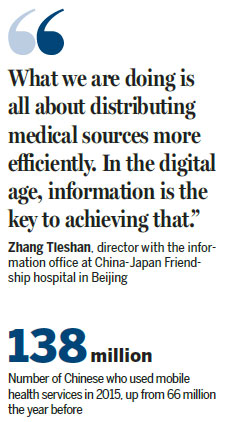
For the moment big companies, small app developers and hospitals are developing a plethora of apps aimed at making health care services more accessible and reducing the costs of medical treatment.
On Jan 16, Beijing Ciji Network Technology, a subsidiary of Ciming Checkup, launched Jijiankang, an app that keeps track of a user's health data and provides professional advice and health management services.
The app was the company's first big move into mhealth after two health checkup industry leaders, Ciming Checkup and Health 100 merged late last year, in itself a hint of the kind of commercial jockeying for position and power that the industry is likely to see as it grows.
More than 30 million health checkup reports have been input into the app's database, and anyone who has had health checkups with Ciming Checkup and Health 100 can read the digital reports after registering online.
Health reports from other checkup services can also be put into the app's database, the aim being to ensure that all of a client's health and medical records are synchronized, making it easier to obtain health advice and medical treatment from professionals no matter who they are or where they are. Services provided include professional explanations regarding certain results in a report, and health warnings based on comparing a user's medical checkup reports from previous years. The app also makes available to users information on paid services provided by health facilities, such as risk evaluation on cancer, Alzheimer's and cardiovascular disease, and personalized health management advice.
Users deciding to avail of such services can make appointments with professionals through the app and pay for them through the same channel.
"With electronic payment platforms such as WeChat and Alipay, a smartphone becomes an electronic purse, and with Jijiankang, a smartphone becomes a health guardian," says Kang Guixia, co-founder and chief technology officer of Beijing Ciji Network Technology.
"Our goal is to halve the incidence of chronic diseases among users," Kang says.
But making health data widely available for personal health management is just one of the many functions mhealth performs.
In China, where the distribution and quality of medical services can vary greatly from region to region, city to city and town to town it is common to wait for days and months to get an appointment with a senior doctor, especially in the best hospitals.
Some people become so desperate that they are willing to pay thousands of yuan to buy from scalpers an appointment with a medical expert that in a hospital's official system often costs just 14 yuan. Mhealth holds the promise of reducing the prevalence of such unscrupulous practices.
Many hospitals have developed a mobile system for patients to make appointment with doctors. These hospitals include Beijing Children's Hospital, Peking Union Medical College Hospital, Nanjing Children's Hospital in Nanjing, Jiangsu province, and Xin Hua Hospital and Rui Jin Hospital in Shanghai, the latter two linked to Shanghai Jiao Tong University School of Medicine.
Zhang Tieshan, director of the information office of the China-Japan Friendship Hospital inBeijing, enthuses over the potential that mhealth has in helping patients find doctors they need.
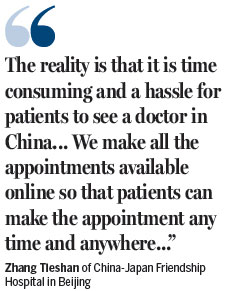
The hospital started working with the IT giant Baidu in 2013, and now all its 40,000 appointment opportunities with doctors in a day are available five to 10 days in advance on Baidu Doctor, an app for making appointments with physicians.
"The reality is that it is time-consuming and a hassle for patients to see a doctor in China because of the limited pool of resources and the lack of equilibrium in how they are distributed," Zhang says.
"We make all the appointments available online so that patients can make the appointment any time and anywhere in a way that suits them."
Apart from using the app, clients can also make appointments through the hospital's official WeChat account, as well as through entries about its doctors or clinical departments on its website and Baidu Encyclopedia. There are also links to Baidu Doctor.
Users can also share appointment entries with friends through social media.
Hospitals can often be monolithic labyrinths in which it is easy to get lost, and the apps provide digital maps of hospitals that are so detailed that patients can search for routes even within a single floor.
"What we are doing is all about distributing medical sources more efficiently," Zhang says. "In the digital age, information is the key to achieving that"
Haodf, literally good doctor, was among the first in China to offer appointments with doctors and other health service for smartphone users.
Established in 2006, haodf.com is the most widely recognized doctor review and disease consulting website platform in the country, covering more than 374,000 doctors from more than 4,600 hospitals nationwide.
About 100,000 doctors answer queries on disease diagnosis and treatment from patients on the website, and they write disease education articles from a clinical perspective.
In 2011 Haodf developed two apps - one for patients and the other for doctors - to exploit the new health care practice on mobile devices, and to encourage one-to-one communication between doctors and patients.
In the case of illness, app clients can put questions to the doctor of their choice, either through free online consulting, or through paid phone calls that cost 100 yuan to 200 yuan per 10 to 15 minutes.
They can also make appointments with doctors, including 4,000 of the top specialists.
In a medical consultation in a hospital, patients can scan a code on a doctors' desk that allows them to communicate with the doctor through the app later.
About 40,000 doctors have registered to use the app as a tool for follow-ups with patients, says Liu Siyue, a marketing executive with Haodf.
Additionally, the company offers a kind of triaging service in which patients with certain questions can be directed to the appropriate doctors. Patients can also make records about ailments, including symptoms, and about medication, making it easier to communicate accurately and effectively with doctors either online or offline.
Doctors are able to submit articles about disease prevention and treatment to the app available to all users and, more importantly, ensure that articles relevant to certain users are directed to them, says Liu.
"With mobile devices such as smartphones it is much easier for patients and doctors to communicate directly."
Zhang Tieshan, director of China-Japan Friendship Hospital, believes there is much more that mhealth has to contribute in China. More apps need to be developed to optimize health care and make hospitals function more efficiently, he says.
For example, apps should make it easy to pay medical bills online, thus saving time for both patients and hospitals.
For those who need to go to a hospital often, such as pregnant women having checkups, apps linked to medical insurance packages should be developed to obviate the need for having repeatedly to go through the same processes, whether they relate to treatment or payment, says Zhang.
He also advocates long-distance medical care, sharing of health data - such as on adverse drug reactions and histories of allergies - and electronic medical records, and broader collaboration among different clinical departments and hospitals.
Hospital services could also be greatly streamlined by integrating medical consumable material suppliers into their mobile systems, he says.
Ultimately, Zhang says, everyone will benefit from this informatization in terms of efficiency, reducing costs and delivering better medical services.
However, one mobile industry practitioner who asked not to be identified, but who wanted to add a dose of realism to such optimism, says that mhealth in China needs to achieve many more things before it can be said that the promised revolution has been delivered and the status quo has been upended.
For one thing, this observer says, many app developers are simply copycats out to make a quick buck who are apt to waste valuable social resources and leave the health care sector short of the innovation it so desperately needs.
In this pioneering field, too, a consistent set of legal frameworks is yet to be developed, leaving many open to risks of all sorts, he says.
Contact the writer at liuzhihua@chinadaily.com.cn
Instant help on the screen for patients and doctors
We Doctor
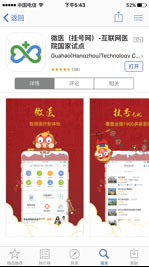
This app promotes a tiered health system in which top specialists can develop their own practice group comprising of physicians in various locations, in particular underprivileged areas, through a network allowing patients to get remote diagnosis and treatment. It enables patients and doctors to communicate through text, voice and videos and helps patients make appointments with doctors.
Chunyu Yisheng
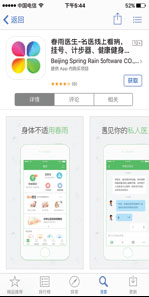
The owners of this app say it has 92 million active users and 410,000 registered doctors, and that doctors answer as many as 330,000 inquiries from users a day. It also provides a paid service in which physicians become users' private family doctors online and offline.
Xingren Doctor
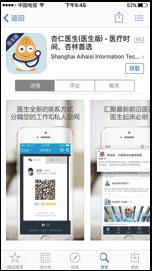
This app is for doctors only. It was launched in September 2014, and its developers say it covers about 369,000 doctors from 36,208 hospitals. It provides tools for them to communicate with patients more effectively and to manage their care.
Dingxiang Doctor
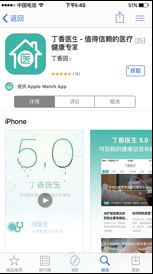
DXY, the largest online academic portal for Chinese physicians and life science professionals, developed this app, which is aimed at the general public, saying that there is too much commercially oriented, and inaccurate articles about disease prevention and treatment online. The app makes available a large collection of popular science articles on hospitals and various health conditions. It also offers consultations with doctors and gives advice on choosing a hospital.
Dayima
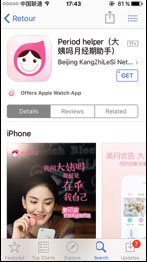
A menstruation management app launched in 2012. It keeps records of a woman's cycle, forecasting menstruation and the chances of pregnancy. It also offers advice on the premenstrual syndrome and other advice based on clients' records, gives lifestyle advice, and serves as a discussion community on topics related to women's health and fitness. It is also a shopping channel for women, and the app's developers say it has 60 million users.
Qingpingguo Jiankang (Green Apple Health)
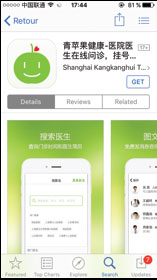
This app, launched in Shanghai in 2013, aims to keep doctors and patients in contact with one another after they have met in hospitals. Patients can ask for advice from doctors, while doctors can do follow-ups with their patients, including collecting data for academic purposes. The app's developers say it has more than 30,000 doctor users in Beijing and Shanghai.
Soyoung

One of the largest online communities where people can show photos depicting the outcome of plastic surgery, and an e-commerce platform for such surgery. Soyoung launched the app in late 2013, and says it has been downloaded more than 10 million times and has 6 million registered users.
Wei Tang
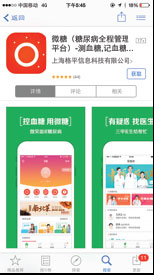
One of themost popular health management and consulting apps among those with diabetes and those who treat it. Based on blood sugar levels, users can seek professional advice on diet, exercise and medication from specialists.
Xiao Pingguo
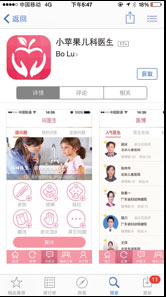
China has only 96,000 licensed pediatric physicians, that is to say for every 10,000 Chinese children there are 4.3 pediatricians, while in the United States the number of doctors is more than triple that. The app, which came out last year, aims to furnish parents with advice from pediatricians in case of non-severe ailments that need no hospital care, and to provide quick access to hospital treatment and hospital transfers.
Ai Ding Doctor
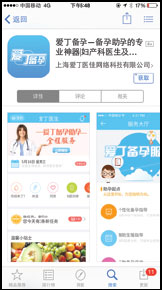
The app, launched in 2013, is targeted at couples wishing to have a baby. It offers personalized guidance on diet, ovulation and psychological support. It also provides consultations with medical professionals and access to offline medical services.
(China Daily USA 02/22/2016 page7)
- Missing children found safe in nearby village
- Rich Chinese splurge on sportswear as luxury's lustre dims
- Urgent remedy sought for pediatrician shortage
- China starts safety check for school buses as new semester draws near
- Ticket scalpers face crackdown at Beijing hospitals
- Judicial DNA test in hot demand after policy change
- Classic Car Show kicks off in London
- Balkan, Austria police agree to register refugees on Macedonian border
- Turkey blames Kurdish militants for Ankara bomb; vows reprisals
- Britain scrambles fighters to intercept Russian bombers
- Chinese community to protest against Peter Liang's verdict
- Car bomb attack on military in Turkish capital kills 28

 The world in photos: Feb 15 - 21
The world in photos: Feb 15 - 21
 Chinese photographers' work shines in major photo contest
Chinese photographers' work shines in major photo contest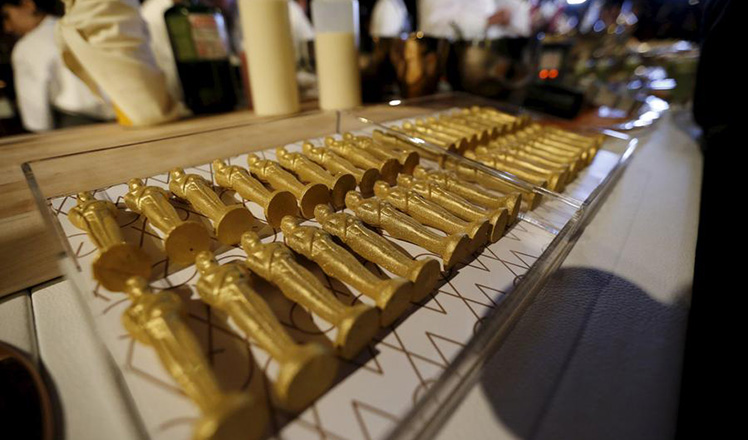
 88th Academy Awards Governors Ball Press Preview
88th Academy Awards Governors Ball Press Preview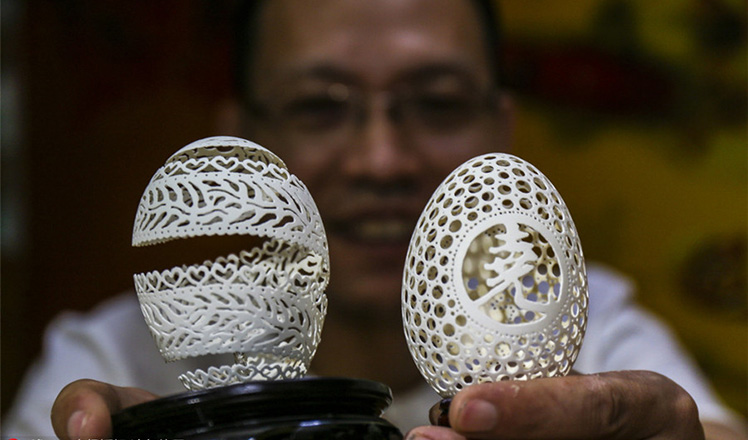
 Egg carving master challenges Guinness World Record
Egg carving master challenges Guinness World Record
 Missing children found safe in nearby village
Missing children found safe in nearby village
 Madonna's world tour lands in Hong Kong
Madonna's world tour lands in Hong Kong
 Producing high-speed rail tracks
Producing high-speed rail tracks 
 Surreal world created by Canadian photographer
Surreal world created by Canadian photographer
Most Viewed
Editor's Picks

|

|

|

|

|

|
Today's Top News
What ends Jeb Bush's White House hopes
Investigation for Nicolas's campaign
Will US-ASEAN meeting be good for region?
Accentuate the positive in Sino-US relations
Dangerous games on peninsula will have no winner
National Art Museum showing 400 puppets in new exhibition
Finest Chinese porcelains expected to fetch over $28 million
Monkey portraits by Chinese ink painting masters
US Weekly

|

|
